 More exciting content, please click the blue text above to follow us!
More exciting content, please click the blue text above to follow us!

In the theoretical system of Traditional Chinese Medicine (TCM), the health status of the human body is closely related to the balance of Qi (气), Blood (血), Yin (阴), and Yang (阳). The four common physical states of Qi deficiency (气虚), Blood deficiency (血虚), Yin deficiency (阴虚), and Yang deficiency (阳虚) reflect imbalances in the body, each with unique manifestations. Qi deficiency individuals are like a car lacking sufficient power. They often feel fatigued and weak, becoming breathless with minimal activity, as if burdened by an invisible weight. Their voices are usually low and weak, like an instrument missing its resonant box. Moreover, those with Qi deficiency tend to sweat easily, even without vigorous exercise, due to the weakened function of Qi to hold in fluids. Qi deficiency often presents with a pale or sallow complexion, lacking a rosy glow.For those with Qi deficiency, herbs such as Ren Shen (Ginseng) and Huang Qi (Astragalus) can be selected for nourishment.
Qi deficiency individuals are like a car lacking sufficient power. They often feel fatigued and weak, becoming breathless with minimal activity, as if burdened by an invisible weight. Their voices are usually low and weak, like an instrument missing its resonant box. Moreover, those with Qi deficiency tend to sweat easily, even without vigorous exercise, due to the weakened function of Qi to hold in fluids. Qi deficiency often presents with a pale or sallow complexion, lacking a rosy glow.For those with Qi deficiency, herbs such as Ren Shen (Ginseng) and Huang Qi (Astragalus) can be selected for nourishment.
Ren Shen
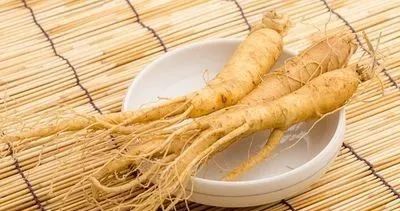
Huang Qi
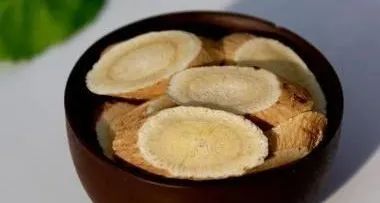 Ren Shen greatly tonifies the original Qi, providing powerful support for the body; Huang Qi has the effects of tonifying Qi, raising Yang, and stabilizing the exterior to stop sweating, and when used together, they can effectively improve symptoms of Qi deficiency. For example, office workers who sit for long periods, lack exercise, and experience high work pressure are prone to Qi deficiency.
Ren Shen greatly tonifies the original Qi, providing powerful support for the body; Huang Qi has the effects of tonifying Qi, raising Yang, and stabilizing the exterior to stop sweating, and when used together, they can effectively improve symptoms of Qi deficiency. For example, office workers who sit for long periods, lack exercise, and experience high work pressure are prone to Qi deficiency. Blood deficiency can be likened to land lacking nourishing water. The most obvious manifestation of this condition is pale and dull complexion, especially with pale lips and nails. They may experience dry eyes and blurred vision, similar to a camera lens lacking the conditions for clear imaging. Women may experience reduced menstrual flow or delayed periods, as blood is the material basis for menstruation. Blood deficiency can also lead to dizziness and palpitations, especially when standing up suddenly or after exertion, where these feelings become more pronounced.When addressing Blood deficiency, commonly used herbs include Dang Gui (Angelica Sinensis) and Ejiao (Donkey-hide Gelatin).
Blood deficiency can be likened to land lacking nourishing water. The most obvious manifestation of this condition is pale and dull complexion, especially with pale lips and nails. They may experience dry eyes and blurred vision, similar to a camera lens lacking the conditions for clear imaging. Women may experience reduced menstrual flow or delayed periods, as blood is the material basis for menstruation. Blood deficiency can also lead to dizziness and palpitations, especially when standing up suddenly or after exertion, where these feelings become more pronounced.When addressing Blood deficiency, commonly used herbs include Dang Gui (Angelica Sinensis) and Ejiao (Donkey-hide Gelatin).
Dang Gui
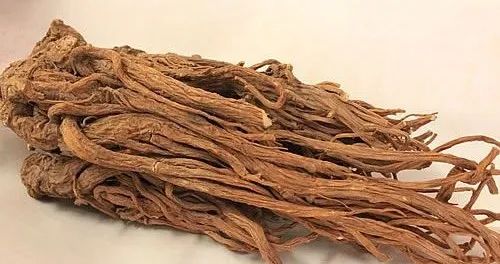
Ejiao
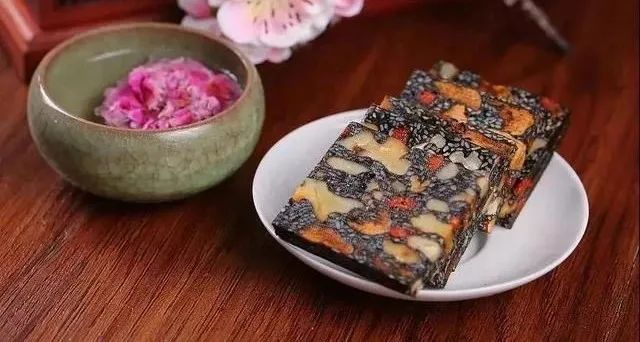 Dang Gui can both nourish and invigorate the blood, replenishing and maintaining its vitality; Ejiao is a superior blood tonic, rich in collagen and other nutrients, significantly effective for nourishing the blood. Blood deficiency is common among postpartum women or those with long-term nutritional deficiencies.
Dang Gui can both nourish and invigorate the blood, replenishing and maintaining its vitality; Ejiao is a superior blood tonic, rich in collagen and other nutrients, significantly effective for nourishing the blood. Blood deficiency is common among postpartum women or those with long-term nutritional deficiencies. Yin deficiency is like a forest suffering from a long drought, lacking the nourishing rain. Individuals with Yin deficiency often feel dry mouth and throat, as if their throat is on fire, needing to drink frequently for relief. They may experience a sensation of heat in their palms, soles, and heart area, as if a small furnace is continuously burning within, a phenomenon known as “Five Hearts Heat (五心烦热).” At night, those with Yin deficiency may experience night sweats, sweating unconsciously during sleep, which stops upon waking. Additionally, their emotions may be more irritable, as Yin deficiency can lead to empty heat rising, disturbing the mind.To nourish Yin deficiency, herbs such as Mai Dong (Ophiopogon) and Shi Hu (Dendrobium) can be used.
Yin deficiency is like a forest suffering from a long drought, lacking the nourishing rain. Individuals with Yin deficiency often feel dry mouth and throat, as if their throat is on fire, needing to drink frequently for relief. They may experience a sensation of heat in their palms, soles, and heart area, as if a small furnace is continuously burning within, a phenomenon known as “Five Hearts Heat (五心烦热).” At night, those with Yin deficiency may experience night sweats, sweating unconsciously during sleep, which stops upon waking. Additionally, their emotions may be more irritable, as Yin deficiency can lead to empty heat rising, disturbing the mind.To nourish Yin deficiency, herbs such as Mai Dong (Ophiopogon) and Shi Hu (Dendrobium) can be used.
Mai Dong
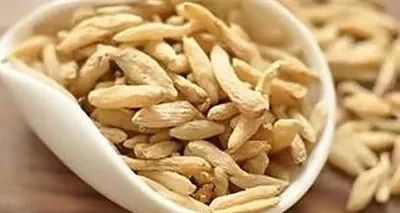
Shi Hu
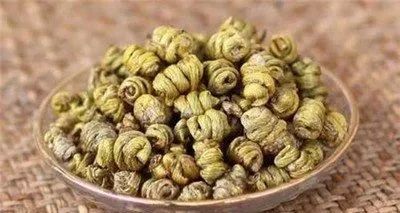 Mai Dong has the effects of nourishing Yin, moistening the lungs, and benefiting the stomach to generate fluids;Shi Hu can nourish the stomach Yin and kidney Yin, effectively alleviating the dry heat symptoms of Yin deficiency. Those who often stay up late, overwork, or have excessive sexual activity are prone to Yin deficiency.
Mai Dong has the effects of nourishing Yin, moistening the lungs, and benefiting the stomach to generate fluids;Shi Hu can nourish the stomach Yin and kidney Yin, effectively alleviating the dry heat symptoms of Yin deficiency. Those who often stay up late, overwork, or have excessive sexual activity are prone to Yin deficiency. Yang deficiency is like lacking the warmth of sunlight in winter. Individuals with Yang deficiency are particularly sensitive to cold; even in warm environments, their hands and feet are often cold, like ice cubes that are hard to melt. They tend to have a low energy state, preferring to curl up their bodies, as if seeking more warmth. Yang deficiency can also lead to soreness in the lower back and knees, as the kidneys govern the bones, and kidney Yang is the root of the body’s Yang energy. Frequent clear and long urination, along with loose stools, are also common manifestations of Yang deficiency, due to insufficient Yang energy to properly transform and transport fluids. When addressing Yang deficiency, herbs such as Lu Rong (Deer Antler Velvet) and Rou Cong Rong (Cistanche) can be selected.
Yang deficiency is like lacking the warmth of sunlight in winter. Individuals with Yang deficiency are particularly sensitive to cold; even in warm environments, their hands and feet are often cold, like ice cubes that are hard to melt. They tend to have a low energy state, preferring to curl up their bodies, as if seeking more warmth. Yang deficiency can also lead to soreness in the lower back and knees, as the kidneys govern the bones, and kidney Yang is the root of the body’s Yang energy. Frequent clear and long urination, along with loose stools, are also common manifestations of Yang deficiency, due to insufficient Yang energy to properly transform and transport fluids. When addressing Yang deficiency, herbs such as Lu Rong (Deer Antler Velvet) and Rou Cong Rong (Cistanche) can be selected.
Lu Rong
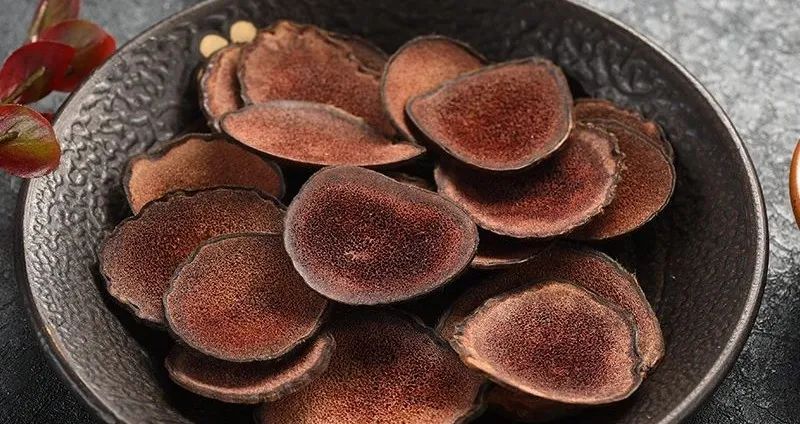
Rou Cong Rong
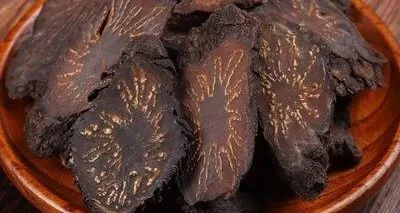 Lu Rong warms and tonifies kidney Yang, benefiting essence and nourishing blood, making it a precious herb for replenishing Yang energy; Rou Cong Rong can tonify kidney Yang, benefit essence and blood, and relieve symptoms such as lower back soreness and abnormal bowel movements caused by Yang deficiency. Yang deficiency is more common among the elderly or those living in cold and damp environments.
Lu Rong warms and tonifies kidney Yang, benefiting essence and nourishing blood, making it a precious herb for replenishing Yang energy; Rou Cong Rong can tonify kidney Yang, benefit essence and blood, and relieve symptoms such as lower back soreness and abnormal bowel movements caused by Yang deficiency. Yang deficiency is more common among the elderly or those living in cold and damp environments. In summary,Qi deficiency primarily manifests as insufficient bodily energy, Blood deficiency focuses on the deficiency of blood, Yin deficiency results from a lack of nourishing Yin fluids leading to empty heat, and Yang deficiency is characterized by insufficient Yang energy causing sensitivity to cold. Accurately distinguishing these four physical states is crucial for implementing targeted nourishing measures, whether through dietary adjustments, exercise, or herbal remedies, all need to be tailored according to the specific characteristics of each constitution.
In summary,Qi deficiency primarily manifests as insufficient bodily energy, Blood deficiency focuses on the deficiency of blood, Yin deficiency results from a lack of nourishing Yin fluids leading to empty heat, and Yang deficiency is characterized by insufficient Yang energy causing sensitivity to cold. Accurately distinguishing these four physical states is crucial for implementing targeted nourishing measures, whether through dietary adjustments, exercise, or herbal remedies, all need to be tailored according to the specific characteristics of each constitution.

